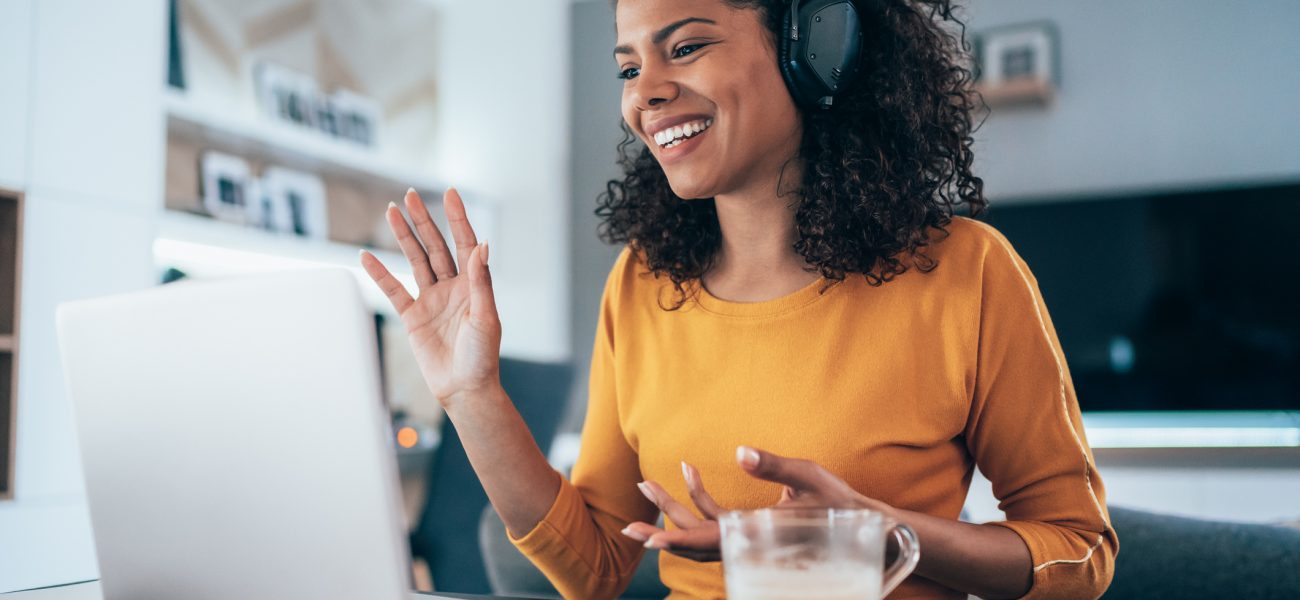Zoom, FaceTime, Houseparty – it’s safe to say technology has been a saving Grace when it comes to lockdown socialising, but why can virtual calls be *so* awkward when a real-life meet-up with your friends wouldn’t be?
We spoke to Dr Meg Arroll, chartered psychologist on behalf of Healthspan for the facts.
“When we communicate with others, we rely on both verbal and non-verbal cues,” explains Arroll.
“On video calls, we have to concentrate more to decipher these cues, such as facial expressions, body language and gestures, as well as the tone and pitch of someone’s voice. If we ‘miss’ these subtle signs, the conversation will not flow as naturally as it would do in person, often making the entire interaction feel rather awkward.
“To combat this, make sure you have a good quality monitor and headphones so that you’re not having to strain to hear intonation or see small movements.”
Poor Connection
“Video calls can also lead to a feeling of disembodiment, where our minds are not truly connected with your physical actions. Calls in large groups can be especially challenging, as we lose our sense of self in the crowded screen, with many people finding it much harder to express their personal voice compared to face-to-face meetings.
“It can be useful to arrange virtual ‘break-out’ rooms to ensure everyone has an opportunity to contribute to the discussion. If you do find video conferencing particularly difficult, make sure you schedule transition breaks in between calls, such as engaging in the ritual of making a hot drink, doing a bit of gentle stretching or walking in the fresh air for a few minutes to reconnect the mind and body”
Mirror Mirror
“Video conferences tools not only project camera feeds of our friends and colleagues, but we also see ourselves on screen. This can feel very unnatural as we wouldn’t normally be subject to a mirror image when communicating with others – and it can be very hard not to be distracted by this!
“This may lead to a heightened sense of self-consciousness or pressure to perform. If you do find this a distraction, look in your options menu and click ‘hide myself’ – everyone else on the call will still be able to see you, but you’ll be able to concentrate more fully on the content of the call rather than being drawn to your own projected image.”
Silence Is Golden
“Silence plays an important part in effective communication, but when we’re on video calls, any dead space may cause tech-panic.
“Technology certainly isn’t faultless, so rather than appreciating silence as a pause, it may be perceived as loss of internet connection or computer glitch – to avoid this, test your system, close any unnecessary applications, as well as additional tabs you aren’t using as these can slow down your connection.
“Reassure yourself that silence is a natural and useful part of any interaction and not necessarily a sign that something is wrong. Taking deep breaths to help you sit with the silence can also help.”
Down To Earth
“Even when using video conferencing for something fun like a virtual pub quiz, it can still create a peripheral sense of unease.
“This is because seeing your mates on screen is a stark reminder of the current restrictions to life, and the tragic consequences some families have had to bear from the pandemic. This subtle discomfort may be just on the edge of our awareness, so that we can’t quite put our finger on why social Zoom or Skype gatherings feel awkward, but it is often due to the psychological tension between enjoying life when we know others are suffering.
“Try and speak to close friends or family openly about how the pandemic is affecting you emotionally to help protect long-term mental health.”






















